
Changyuan County is a county in the east of Henan province, China, bordering Shandong province to the east. Formerly under the administration of the prefecture-level city of Xinxiang, since 1 January 2014 it has been directly administered by the province.
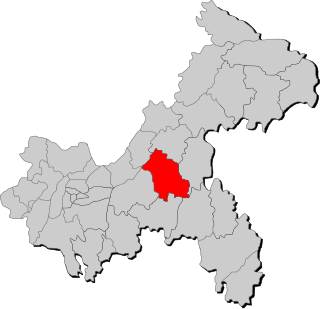
Fengdu County is a county located in Chongqing Municipality, People's Republic of China. The county was established as Fengdu County (豐都縣) during the Sui Dynasty. The name was changed to Fengdu County (酆都縣) during the Ming Dynasty. In 1958, the name was changed back to Fengdu County (豐都縣).
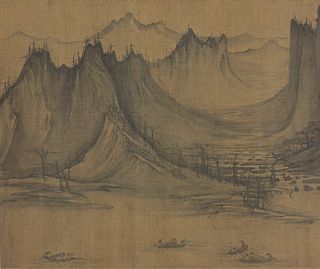
Xu Daoning was a Chinese painter of the Northern Song Dynasty (960–1279) from Chang'an or Hejian. He started out life by selling medicine prescriptions in Kaifeng. While selling prescriptions, he also began painting nature scenes in the style of Li Cheng. After gaining popularity he took up painting murals for Chinese nobles. His most notable work is Fishermen's Evening Song.

Chengkou County is a county in Chongqing municipality, China, and is the northernmost county-level division of Chongqing, bordering the provinces of Shaanxi and Sichuan to the north and west, respectively. To the northeast, the county borders Zhengping County, Pingli County, Langao County and Ziyang County of Ankang, Shaanxi. To the west, the county borders Wanyuan and Xuanhan County of Dazhou, Sichuan. To the south, the county borders Chongqing's Kaizhou District and Wuxi County.

Yunmeng County is a county in eastern Hubei province, People's Republic of China. It is administered by Xiaogan City and is located just outside Xiaogan's urban area.
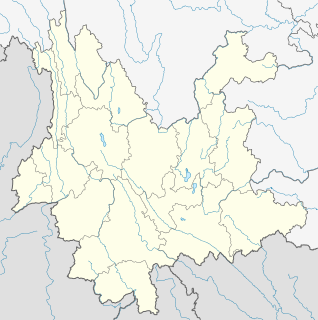
Shuangbai County is under the administration of the Chuxiong Yi Autonomous Prefecture, in the central part of Yunnan province, China. It is the southernmost county-level division of Chuxiong Prefecture.

Wuding County is under the administration of the Chuxiong Yi Autonomous Prefecture, in the north-central part of Yunnan province, China, bordering Sichuan province to the north.
Huaiyuan County is a county in the north of Anhui Province, China. It is under the administration of Bengbu city.

Fengyang County is a county in north-central Anhui Province, China. It is under the administration of Chuzhou, a prefecture-level city.

Huimin County is a county of northwestern Shandong province, People's Republic of China. It is under the administration of Binzhou City.

Guantao County is a county of southern Hebei province, China, bordering Shandong's Guan County and Linqing to the east across the Wei Canal (卫运河). It is under the administration of Handan City, and has a population of 320,000 residing in an area of 456 km2 (176 sq mi). Jinan lies 160 kilometres (99 mi) to the east, Handan 75 km (47 mi) to the west, and Beijing 420 km (260 mi) to the north, and the county is served by G22 Qingdao–Lanzhou Expressway and China National Highways 106 and 309.

Huangchuan County is a county of southeastern Henan province, People's Republic of China. It is located in the center of Xinyang City, straddling the Huang River. That is why it is named Huangchuan, meaning where Huang River flows.

Nan County, or Nanxian is a county in the Province of Hunan, China, it is under the administration of the prefecture-level city of Yiyang.
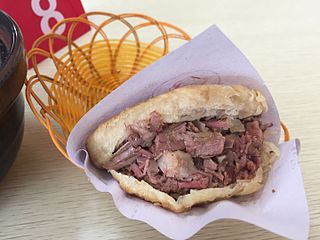
The donkey burger is a kind of sandwich commonly eaten in Baoding and Hejian, Hebei Province, China, where it is considered a local specialty, though it may also be found in other parts of China, particularly in northeastern China. Chopped or shredded donkey meat or offal is placed within a huǒshāo or shao bing, a roasted, semi-flaky bread pocket, and eaten as a snack or as part of a meal. Hejian style typically serves the meat cold in a warm huoshao while Baoding style serves the meat hot, they both often include green chili-pepper and cilantro leaves. Donkey burger is a popular street food and can also be found on the menus of high-end restaurants.
The Hani languages are a group of closely related but distinct languages of the Loloish (Yi) branch of the Tibeto-Burman linguistic group. They are also referred to as the Hanoid languages by Lama (2012) and as the Akoid languages by Bradley (2007).
Li Zhun was a Chinese novelist who was the vice president of China Writers Association and the librarian of Chinese Modern Literature Museum.
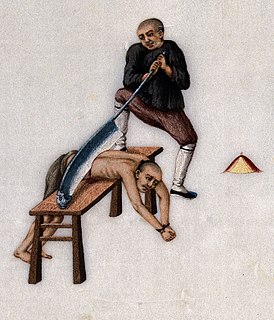
Waist chop or waist cutting was a form of execution used in ancient China. As its name implies, it involved the condemned being sliced in two at the waist by an executioner.
Yingzhoulu Subdistrict is a subdistrict in Hejian, Cangzhou, Hebei, China. Prior to 2016 it was a town known as Yingzhou Town (瀛州镇).
Bozhong Mountain, also known by its Chinese name Bozhong Shan, is a mountain mentioned in the Book of Documents. It is said to be the source of the headwaters of the Han River, the namesake of the Han Dynasty and the Han Chinese. The mountain has been identified as a mountain in southern Shaanxi province's Ningqiang County or as another mountain on the border between Gansu province's Tianshui and Li County in the People's Republic of China. Both mountains are referred to as Bozhong Mountain.















